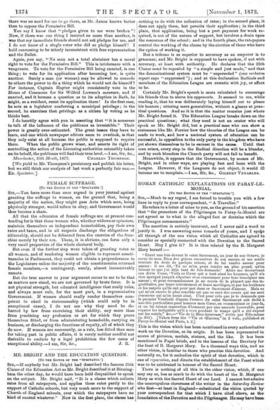FEMALE SUFFRAGE.
[TO THE EDrf OR OF THE "SPECTATOR."] SIR,—You have more than once argued in your journal against granting the suffrage to women, on the ground that, being a majority of the nation, they might pass Acts which men, being physically stronger, would refuse to obey, and Government would thus become a sham.
All that the advocates of female suffrage are at present con- tending for is that those women who, whether widows or spinsters, maintain themselves as independent householders, pay their own rates and taxes, and in all respects discharge the obligations of citizenship, ehould not be debarred from the exercise of the fran- chise merely by their sex. These, it is obvious, can form only a very small proportion of the whole electoral body.
But even if the further step were taken of granting votes to all women, and of rendering women eligible to represent consti- tuencies in Parliament, they could not obtain a preponderance in the Legislature unless the majority of the constituencies returned female members,—a contingency, surely, almost inconceivably remote.
But the true answer to your argument seems to me to be that as matters now stand, we are not governed by brute force. It is not physical strength, but educated intelligence that really rules, and always must rule, for the most part, in a representative Government.. If women should really render themselves com- petent to excel in statesmanship (which could only be in exceptional cases), I do not see why they need be de- barred by law from exercising their ability, any more than from practising any profession or art for which they prove themselves fitted, or from administering households, carrying on business, or discharging the functions of royalty, all of which they do now. If women are necessarily, as a rule, less fitted than men for taking part in public affairs, it is surely neither needful nor desirable to exclude by a legal prohibition the few cases of
exceptional ability.—.I am, Sir, &c., J. R.


































 Previous page
Previous page